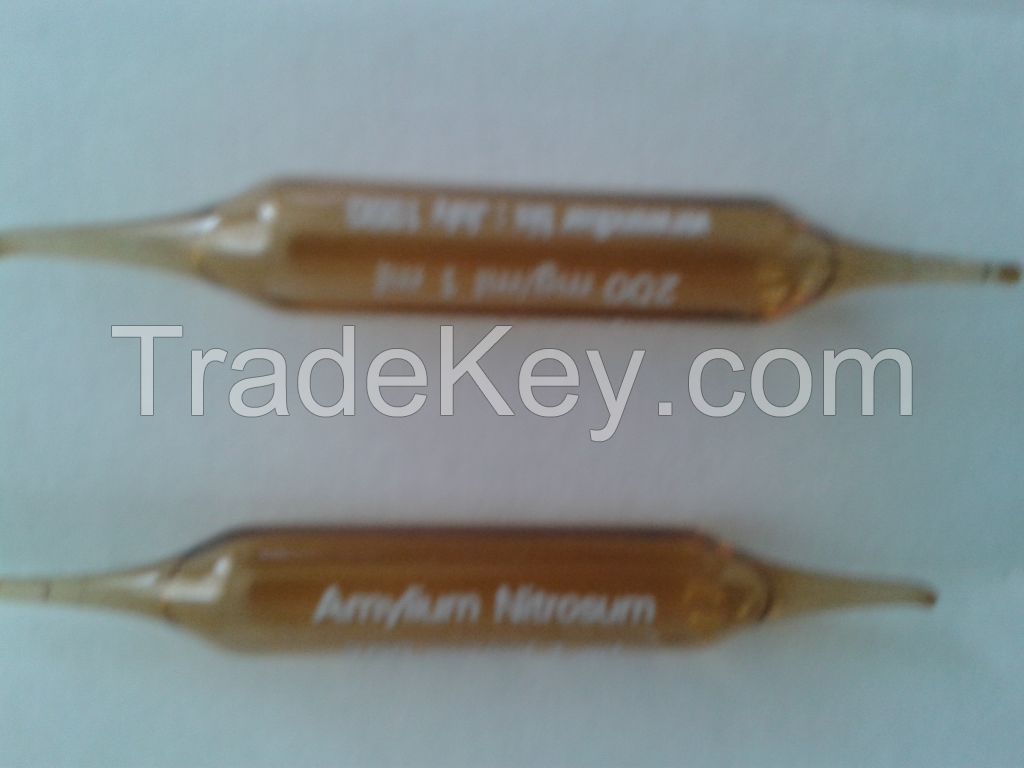
FOB Price
Get Latest Price5 ~ 5 / Box
|Minimum Order
Place of Origin:
-
Price for Minimum Order:
Minimum Order Quantity:
1 Box
Packaging Detail:
-
Delivery Time:
-
Supplying Ability:
-
Payment Type:
Western Union, Money Gram
Bulgaria
連絡先担当者 Mr. Nichko
54 Lipnik, Ruse, Ruse
Amyl nitrite is indicated for the rapid relief of angina pectoris. Its effect appears within *0 seconds and lasts for approximately 3 to 5 minutes.
Since it may increase intraocular and intracranial pressures, amyl nitrite is contraindicated or should be used with great caution in patients with glaucoma, recent head trauma or cerebral hemorrhage. Amyl nitrite can cause harm to the fetus when it is administered to a pregnant woman because it significantly reduces systemic blood pressure and blood flow on the maternal side of the placenta.
Transient episodes of dizziness, weakness, or syncope or other signs of cerebral ischemia due to postural hypotension may develop following inhalation of amyl nitrite, particularly if the patient is standing immobile. To hasten recovery, measures which facilitate venous return such as head low posture, deep breathing and movement of extremities may be used.
Amyl nitrite is very flammable. Do not use where it might become ignited. General - Tolerance to amyl nitrite may develop with repeated use of the drug for prolonged periods of time. Tolerance may be minimized by beginning with the smallest effective dose and alternating the drug with another coronary vasodilator. High doses of nitrites may produce methemoglobinemia, especially in individuals with methemoglobin reductase deficiency or other metabolic abnormality that interferes with the normal conversion of methemoglobin back to hemoglobin. Patient Information - Amyl nitrite should be taken by the patient when seated or lying down. Drug Interactions - Taking amyl nitrite after drinking alcohol may worsen side effects and may cause severe hypotension and cardiovascular collapse. Carcinogenesis, Mutagenesis, Fertility Impairment - Adequate long term studies to establish adverse carcinogenic potential of this drug have not been reported. Pregnancy - Teratogenic effects. Category C. Animal studies have not been conducted with amyl nitrite. It is also not known whether amyl nitrite can cause fetal harm when administered to a pregnant woman or can affect reproduction capacity. Amyl nitrite should be given to a pregnant woman only if clearly needed. Nursing Mothers - It is not known whether this drug is excreted in human milk. Because many drugs are excreted in human milk, caution should be exercised when amyl nitrite is administered to a nursing woman. Pediatric Use - Safety and effectiveness in children have not been established.
Mild transitory headache, dizziness and flushing of the face are common with the use of amyl nitrite. The following adverse reactions may occur in susceptible patients syncope, involuntary passing of urine and feces, hypotension, pallor, cold sweat, tachycardia, restlessness, weakness, vomiting and nausea. Excessively high doses of amyl nitrite administered chronically may cause methemoglobinemia.
Abuse. Volatile nitrites are abused for sexual stimulation, with headache as a common side effect. Dependence. Tolerance to nitrites can develop conditions and duration have not been established.
Symptons. Inhaled doses of 5 to *0 drops of amyl nitrite may cause violent flushing of the face, accompanied by a feeling of imminent bursting of the head and very excessive heart action. The inhalation of larger amounts may produce a feeling of suffocation and muscular weakness. Symptons comparable to shock may be produced such as weakness, restlessness sweating pallor nausea vomiting snycope and incontinence attributable to pooling of blood in the postarteriolar vessels and failure of the venous blood to return to the heart. Treatment. Measures which facilitate venous return such as head low posture, deep breathing and movement of extremities may be used. The use of epinephrine aggravates the shock like reaction. Methylene blue should be injected for treatment of severe methemoglobinemia with dyspnea. For treating cyanide poisoning, methylene blue is contraindicated where nitrites cause iatrogenic methemoglobinemia.